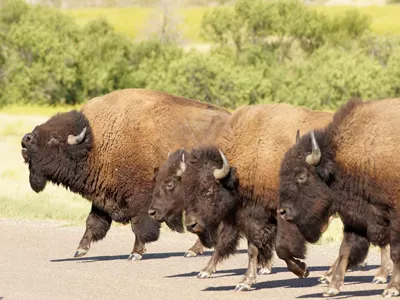
- Details
- By Native News Online Staff
The Theodore Roosevelt National Park in North Dakota on Saturday will begin an operation to reduce its approximate bison population of 700 to 400. The bison will be sent to two North Dakota tribes.
The rehoming of the bison will take up to a week, according to park officials. Bison will be reduced of varying ages among the herd.O
Once the bison are removed from the national park, the transfer will come under tribal management. Tribes that will receive the bison include the Mandan, Hidatsa and Arikara Nation and the Standing Rock Sioux Tribe.
Troy Heinert (Sicangu Lakota), a former South Dakota state senator and current InterTribal Buffalo Council executive director, said the plan is for the bison to provide genetic diversity and increase the size of existing tribal bison herds.
The National Park Service reduces bison population due to concern about increased impacts on park resources such as water, vegetation, soils, archaeological sites, and values such as visitor experience and wilderness character. Reducing the herd size will protect park resources.
The bison reduction project will occur in the park’s South Unit and viewing will be closed to the public for safety concerns.
More Stories Like This
Native News Weekly (August 25, 2024): D.C. BriefsNavajo Utah Commission Approves Six New Weather Stations
First Peoples Fund Announces 2026 Cultural Capital Fellows
Deb Haaland Campaign Responds to Why Her Name is in the Epstein Files
Cadiz, Inc. Announces EPA Selection of Mojave Groundwater Bank Northern Pipeline Project for WIFIA Loan Application
Help us defend tribal sovereignty.
At Native News Online, our mission is rooted in telling the stories that strengthen sovereignty and uplift Indigenous voices — not just at year’s end, but every single day.
Because of your generosity last year, we were able to keep our reporters on the ground in tribal communities, at national gatherings and in the halls of Congress — covering the issues that matter most to Indian Country: sovereignty, culture, education, health and economic opportunity.
That support sustained us through a tough year in 2025. Now, as we look to the year ahead, we need your help right now to ensure warrior journalism remains strong — reporting that defends tribal sovereignty, amplifies Native truth, and holds power accountable.
 The stakes couldn't be higher. Your support keeps Native voices heard, Native stories told and Native sovereignty defended.
The stakes couldn't be higher. Your support keeps Native voices heard, Native stories told and Native sovereignty defended.
Stand with Warrior Journalism today.
Levi Rickert (Potawatomi), Editor & Publisher


